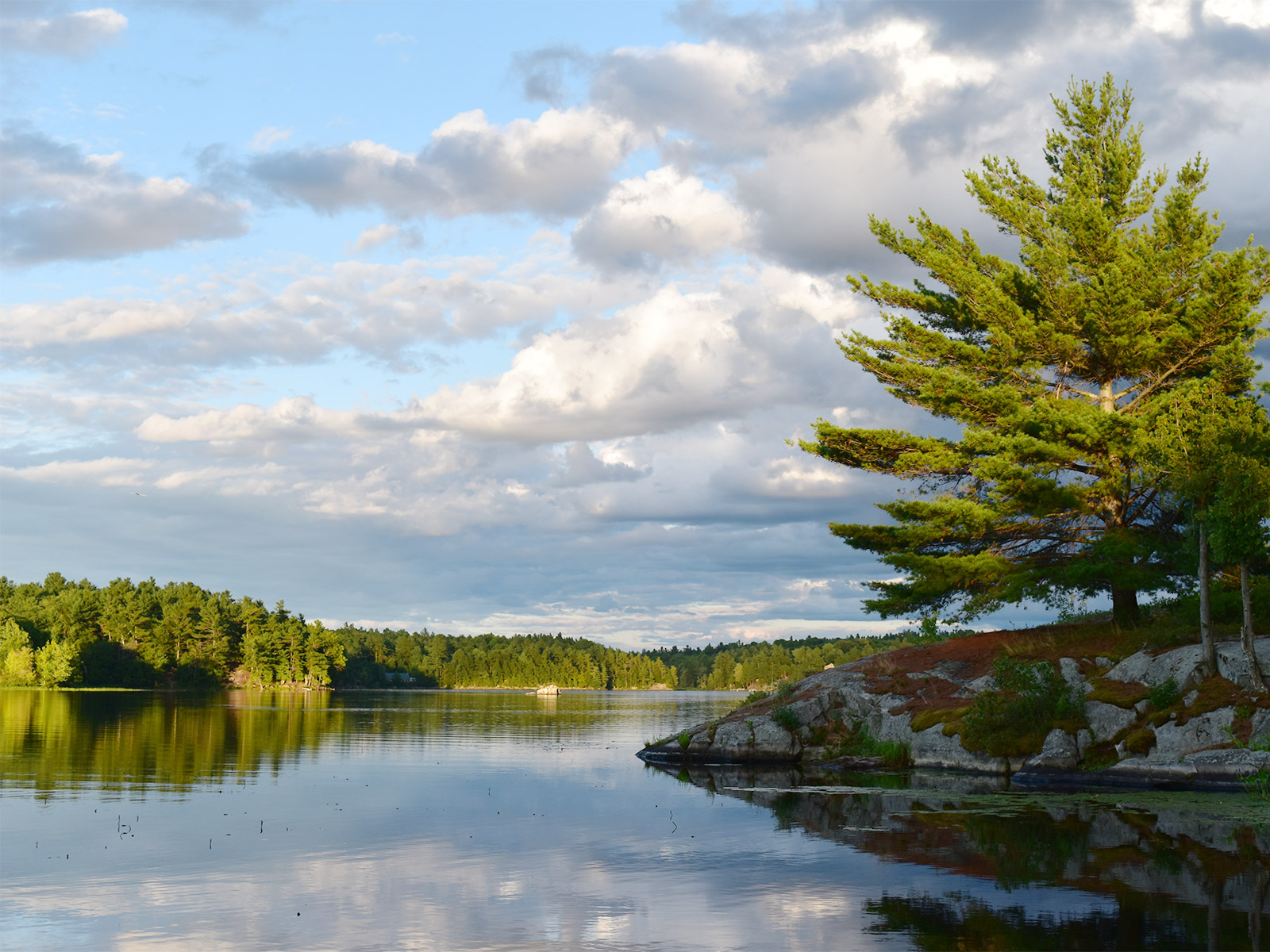Grass Lake History
Grass Lake was likely formed through glacial processes about 10,000 years ago. Some of the earliest records of the lake in recent history date back to the 19th century. In 1889, H.H. Thompson, a man from Brooklyn, wrote an article in The American Angler detailing a trip made to Grass Lake. He calls the lake “one of the best lakes for black bass and pickerel in this state.”
There are countless other mentions of plentiful and large fish in Grass Lake during this period. There has been a historical legacy of managed use on Grass Lake. Stocking fish on Grass Lake dates back to 1881, when a consignment of pickerel were added. Between 1914 and 1930 a series of petitions submitted by local residents asked the State to add additional fishing regulations to Grass Lake, on the grounds that the fish were “in danger of extermination”; these additional regulations were granted.
Today, through additional fishing regulations and a fish stocking program are still in place, pressures such as eutrophication and invasive species pose a threat to the function and utility of this natural resource. (From Owen’s report –Grass Lake Management Plan -2014) Grass Lake- from the History of Theresa) Grass Lake, known by many as the” lower lake” of the Indian River group, is unique in many ways.

It straddles the boundary line of two towns and counties, about ½ being in the town of Theresa and the town of Rosie and the county of St. Lawrence. It has no inlet-its waters are fed by springs, and its outlet flows north through marshlands that are the vestibule of Black Lake. Those who have known the locality for years state that this name came from the fact that quite a considerable portion of the lake seems to have a growth of grass. It is a good-sized lake, 2 miles long and a mile wide at its widest part. It has Islands and fishing.
Grass Lake brings to mind the Harris families that have owned land on this lake for a long time. In fact, they cleared the lands in this section and built their home within plain view of the lake. Their descendants were living in there through the 1940’s. Their holding increased considerably over the years until, in the 1940’s they owned a considerable amount of land in the Grass lake area. About 1904 some fishermen from Utica visited Grass Lake and were so successful that they returned again and again, bring others with them. This resulted in the forming of an organization of Utica people which called themselves the Myrtle and Ivy Fishing Club. Previously the people had been staying at the 2 Harris farm house in large number, but now they purchased some land on the shore and erected a fine club house. The club members had their own Ice house lighting system and boat house.
Later, some of the members, desiring to remain at the lake all through the summer built cottages and spent three or four months at the attractive country retreat. Thus did the fame of Grass Lake Spread. An older member of this club passed away the club house and cottage went on the market and the Harris family purchased them. In fact, the Harris family began building a string of cottages and summers would find them well filled with fisherman.
What’s All This Talk About Monster Pickerel? Those who fish in Grass Lake have reported that it is an ideal fishing ground. In September, 1905, Mr. Brunett, with Mrs. Buttonschoen (Utica) were fishing in the lake when they struck a snag. The snag proved to be a fish — a pickerel — that gave the fisherman some busy moments. It was a question who would get tired first, the fish or the fisherman. At last the fish was in the boat and they both said they had never seen the like of it before. The fish weighted 19 ¾ pounds, the largest one ever taken from the lake. It measured 42 ½ inches long. It was taken to Utica, mounted and shown in public places, and at last placed in the office of the president of the club. In 1941, Mr. and Mrs. Edward Kieffer, Syracuse, went to the lake for an outing. Mr. Kieffer wanted to teach his wife how to fish. She was doing very well casting with a fly rod and a little Wonder spinner. Soon she had a strike and Mr. Kieffer thought he would let her play with the nibble, until he got a sight of the bass. At the moment he was more excited than his wife and when the bass was landed it weighted over 5 ¾ pounds. At the same time a family party went out and caught a total of 16 beauties many of them bass. Some have suggested that there are rich mineral deposits in the rocks near Grass Lake, but no one has been sufficiently convinced of that to commercially develop the area for mining purposes. But as a vacation spot the area reached a high level of popularity during the 1940’s. In 1947 mark Harris, then 77, related his version of the settlement of Grass Lake to Ernest Cook. “When his grandfather came to Grass Lake he marked the trees from Redwood out to the settlement he made, some seven miles away, so he could find the way going and coming, as he went afoot, “ said Mr. Harris. “That was before the days of the roads there.”
I don’t know how Grass Lake came to bear the name, except that the bays had weeds and water grass that seemed to flourish there. I know my grandfather came there; through-it was because he could get meat supply easily. Deer were as plentiful as sheep. It was nothing for him to go out and kill a deer and, when they wanted a change, to get a mess of fish. I have seen my father, Moses Harris start out after supper and in an hour’s time, fishing with one of the boys, come in with a bushel basket full of bullheads. “In time we cleared the land and my father became a successful farmer, giving more attention to the land than to the lake. My sister Nellie and I are giving our attention to the lake. We have erected cottages around the south end of the lake and we have about all we can do summer times looking after the tourist business. My sister purchased the farm north of us so that we own most of the shore line in Jefferson and St. Lawrence counties. All the cottages are on our land, but some are leased to others for a few years yet.”
Mr. Cook first met Mark about 1890 when the Cook’s next door neighbor to the east of the Cook farm in West Theresa, Philo Soper, came over to tell them that he had at last secured the perfect hired boy. He stated that when on fishing trips to Grass Lake he had observed the perfect manner in which Moses Harris had conducted his farming and had made bold to ask if he could hire one of the boys. He did and it was Mark Harris secured. In time Mark began to visit the Cook’s after work hours on the farm.
About 1895 Mr. Tilden, who had a fleet of big red tin, horse-drawn peddle carts on the highways in northern New York, was looking for a faithful and honest young man to take charge of one of the carts. He referred to Mark Harris. When Ernest Cook asked Mark how he came to leave farming to drive a cart to sell tin ware and gather rags and old rubber and iron this is the answer he got: Well, said Mark, “I hardly know myself. The work seemed to appeal to me, riding around the country, seeing what people were doing on their farms and doing business with many of them. I suppose the big thing that turned the scales for me was the fine salary he offered me. It doesn’t look big now, but 55 years ago it seemed like a gold mine. He said he would give me $250.00 for the year and furnish me everything; rig, living and expenses. “That seemed to settle it and I went into Watertown — it seemed like a long way away at that time- and got my instructions and my outfit. Mr. Tilden told me I could go where I pleased but, as a rule, each peddler had his beat to follow, but that was for me to work out. “I never saw a man who could figure in his head like Tilden and before I got away I heard him call down one of his drivers something awful. But I knew the driver was all to blame and didn’t blame Tilden a mite. I want to say that in my working for him, I never received one cross word from him, but he did go out of his way to praise me for the business I did for him and the care I took of his rig. “You know the thing that I worried about most was knowing where to stay overnight. I was rather bashful and didn’t like to put up “hit and miss” fashion. So I decided I would start in around home. I could get back to the farm for nights, and I knew people Rossie way. Of course, as you know, I was well acquainted with your father and mother and I made your place at West Theresa and other headquarters.
In North Gouverneur, I went to Royal Morse’s farm and at Kelsey Bridge at Ed Graham’s. In time, I added other places. “No I never had any serious breakdowns, losses, or trouble in my work. There were times when the road was just awful and I have almost frozen at times on the top of that high cart in cold weather. It was an education.” Mr. Cook went on to say: “At our farm we used to look forward to Mark’s coming with the greatest of pleasure. It would be for over Sunday, and sometimes in between, if he was caught in a storm. He was one of the family and always grabbed a milk pal to help with the milking and mother always planned to have some dish that Marked liked when he came. One winter he came in on a Saturday night, expecting to start out Monday morning. A snow and windstorm on Monday made it impossible for him to leave. The roads were filled fences –high Tuesday and Wednesday. Mark began to worry as he ought to be on the road. Thursday he started out to visit some nearby crossroads, so as to make a showing. He did… He returned that afternoon before 4:00, with his rig piled with rags. He had done actually 3 days of business in one. He unloaded the rags in our barn and the next day took another circuit with good results. Saturday was the same. It was one of his best weeks. Monday he had to get the surplus stock to the train and get a new supply of merchandise.”Mr. Cook concluded his article about Mark Harris in the late 1940’s like this: “Now at this well kept farm near Grass Lake, Mark and Nellie often visit over the days when he was out with the cart, going through the North Country. Now he is about the last one left of the trading era of farm romance.” 5 With the coming of better roads and easier transportation the peddling days were over and Mark settled down on his land. With much of the farm land rented to good tenants, he gave his attention, with his sister to the resort business.
In early 1940’s they sold their property and moved to Theresa Village where they bought a home on Riverside Avenue (the house now owned by Mr. and Mrs. Orin Walts) and were much loved by their neighbors. Mark Harris died in December, 1949 and his sister, Nellie, in May 1965. Both are buried in the Redwood Catholic Cemetery.
Land protection directly supports watershed health! Conserving land helps to reduce erosion and runoff, reduces pollutant export through filtering, preserves natural flow patterns, and minimizes flooding.

